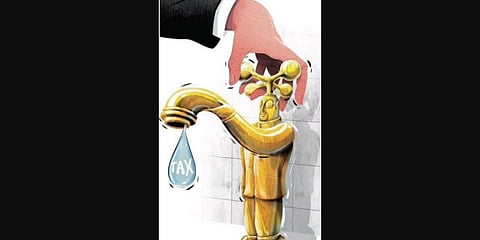

At the recent virtual World Economic Forum (WEF), there was a breathtaking admission and an amazing offer from a group of billionaires. Calling them the ‘Patriotic Millionaires’, the group of more than 100 billionaires and millionaires told the WEF: make us pay more tax. They said the ultra-wealthy were not currently being forced to pay their share of the global economic recovery from the pandemic.
“As millionaires, we know that the current tax system is not fair. Most of us can say that, while the world has gone through an immense amount of suffering in the last two years, we have actually seen our wealth rise during the pandemic - yet few if any of us can honestly say that we pay our fair share in taxes,” the signatories that included Disney heiress Abigail Disney and venture capitalist Nick Hanauer, said in a letter to WEF delegates.
If there were more such benevolent capitalists, the world wouldn’t be such a bad place. Over the course of the pandemic’s last 2 years, as wealth inequality has grown, there have been increasing calls for more progressive taxation. India’s annual budget is on the anvil on 1 February, and it is a good time to weigh these issues.
Inequality and Inflation
Oxfam, a world charity, released a report ‘Inequality Kills’ at the WEF. Its India CEO, Amitabh Behar, told IndiaSpend.com that the transfer of wealth to the rich in India has exploded during the pandemic.
“India had 102 billionaires last year, and now it’s 142. On the other hand, the most conservative estimates say that at least 4.6 crore people have slid into poverty in India.”
Meanwhile, internationally, over the course of the two years, the fortunes of the world’s 10 richest individuals have risen to $1.5 trillion - or by $15,000 a second.
After the second Covid wave subsided around September last year, there was correction and growth. From December onwards though the world has again seen a new pandemic wave, and much of the economic gains have been wiped out. As businesses have again slumped, inflation has shot up.
In India, high prices and an economic slowdown was the unwelcome cocktail in December, and the Reserve Bank (RBI) expects the trend to persist through the fourth quarter.
Data showed retail inflation quickened to a five-month high of 5.56% in December amid soaring food prices, while industrial growth slipped to a 9-month low of 1.4% as pent up demand during the festive months failed to sustain in November.
In most of the developed world, inflation is being seen as a long term threat. Governments are hunkering down and wealth transfers to the poorer world is going slower. In the US, December prices climbed 7% year-over-year, the largest increase since June 1982. Inflation was mainly due to prices of vehicles going up nearly 40%, food is 6.3% higher, and shelter costs have risen by 4.1%.
Progressive taxation
One of the spin-offs of the pandemic, which has triggered the worst recession in history since World War 2, was a broad agreement by 130 countries making it mandatory for companies to pay a global minimum tax rate of 15% wherever they operate. Though this has eliminated evasion of taxes, it is still
not enough.
The pre-Covid narrative encouraged by the corporate world is that high taxation takes away investible surplus, blunts growth and ultimately works against the small man.
The trend the world over has been to lower corporate and individual taxes, expecting better compliance and a wider net will yield higher revenue. India has gone down the same path, lowering income tax on the highest slabs. Wealth tax was abolished in the Union Budget for Financial Year 2016.
This approach has not worked for compliance. Oxfam’s Amitabh Behar cites a Global Tax Network study which says $450 billion are evaded from taxes annually. In India, hundreds have been named in the Pandora Papers — the Indian super-rich who tried to avoid taxes by parking their wealth anonymously in tax havens abroad.
The narrative is now changing. Even among the billionaires. Wealth tax cannot be seen anymore as an anti-growth impost. It is a tool to transfer back assets to the those at the bottom who have taken a hammering.
During the pandemic, two countries - Argentina and Colombia - introduced wealth tax to fund anti-Covid measures. Oxfam’s report argues that by taxing the super-rich just 1% of their wealth, India could fund its entire vaccination programme of Rs 50,000 crore.
Parallelly, we have to move towards a Universal Basic Income. It’s on the agenda in the West where a guaranteed income from the state works as a bulwark against poverty.
Instead of allocations for subsidized food, fertilizer, etc, direct cash transfers to the poor works better. The Congress’ Rahul Gandhi has spoken of a basic income guarantee of Rs 6,000 a month.
Where will it come from? In September 2019, before the Covid-19 pandemic, the Modi government had slashed corporate tax rates for domestic manufacturers from 30% to 22%, and for new manufacturing companies, the rate was reduced from 25% to 15%. These tax cuts cost the exchequer Rs 1.5 lakh crore. Money is being made. Has the government the will to claim it for the poor?